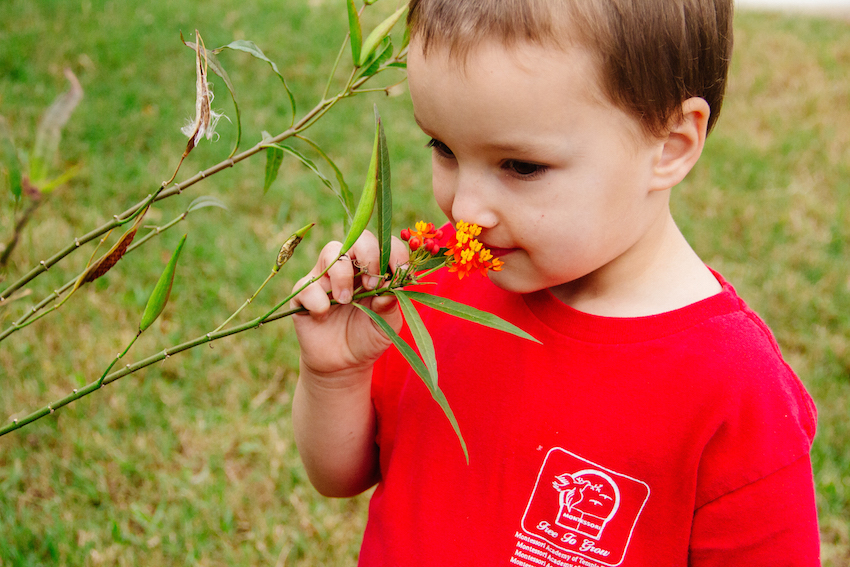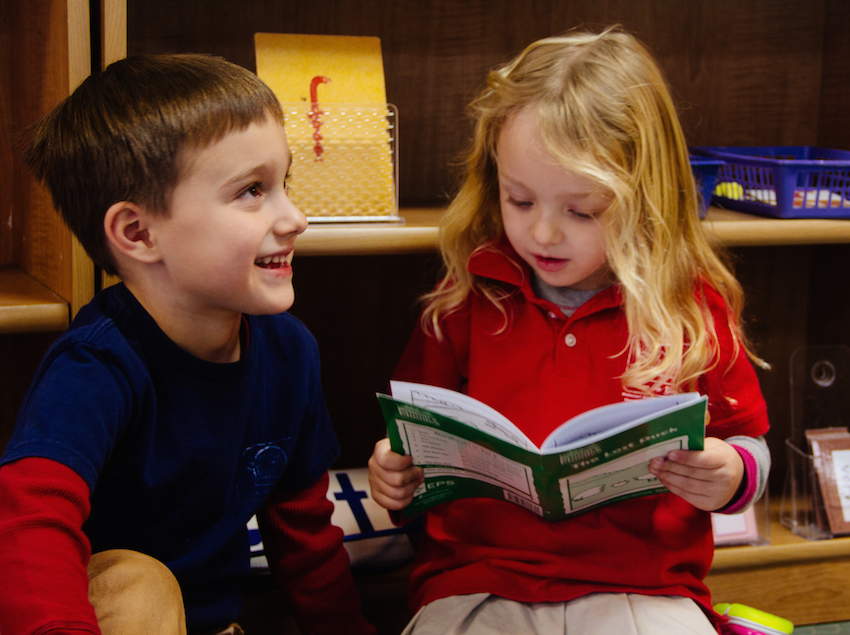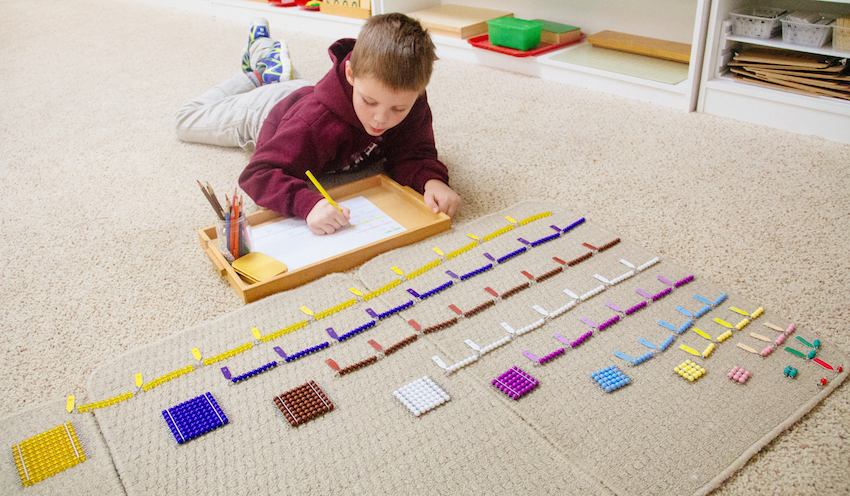“Children are human beings to whom respect is due, superior to us by reason of their innocence and of the greater possibilities of the future.” ~Maria Montessori
Every child is born with an urge to learn, with a deep love for imitation and repetition of purposeful work, and with one intuitive aim; his or her self-development. Dr. Montessori believed that education is a preparation for life and should help children develop a healthy self-concept and a positive attitude toward learning, while simultaneously acquiring the basic study skills which will serve them throughout life.
The Absorbent Mind
The Montessori Method stresses the fact that during the formative years from birth to six, the mind of the child is “absorbent.” At no other time in his or her life, will the early child learn as much or as quickly then during these introductory years! Modern experts agree that it is during the Birth to 6 Years, that a child’s general intelligence, approaches to learning, and basic personality are most strongly formed. They can be changed later only with immense effort.

The Montessori Method dictates that providing a solid foundation of learning for the early child, culminating with “The Year of Fruition” (age 6), is perhaps the most important education of his or her life–we cannot under-estimate the value of providing the Absorbent Mind a stimulating environment.
Three Year Cycle
Children develop in natural cycles, beginning at birth and up to adulthood. Maria Montessori observed distinct Three Year Cycles of normative child development, which show specific Sensitive Periods of learning unique to each cycle. Emphasis is placed on completing each cycle and its specific innate goals to the fullest before moving on to other learning. The cycles are as follows: 0-3 Years, 3-6 Years, 6-9 Years, and so on.
Montessori classrooms and equipment are typically organized to encompass a 2-3 year age span, in order to accommodate the range of Sensitive Periods each child will experience within the Three Year Cycle. Young students experience the daily stimulation of older role models. These young students will in turn blossom into their own responsibilities of leadership. Students not only learn with each other, but from each other.
Working in one classroom for 2-3 years allows students to develop a strong sense of community with their classmates and teachers. The age range also welcomes the intellectually gifted child the stimulation of advanced learning within a classroom of peers who provide a socially/emotionally appropriate environment.
Sensitive Period
Throughout a child’s development, he or she passes through a series of crucial transitory stages called “Sensitive Periods,” during which the child is intensely fascinated with learning a particular characteristic or skill, and is able to acquire and apply this learning more easily than at any other time of his or her life. If the adequate stimulus and opportunity does not occur in a timely manner when a Sensitive Period initially manifests, the child’s capacity and interest to learn a particular characteristic or skill is diminished. It can only be regained with great difficulty. In order for a child to successfully, eagerly, and joyfully progress forward, he/she must master the Sensitive Periods as they arise.
Prepared Environment
To take full advantage of the peak period of sensitivity toward learning, the Montessori approach provides an attractive and carefully prepared environment, especially designed to meet the child’s needs and stimulated his curiosity. Beauty, simplicity, appeal, and logical order are necessary attributes of classroom materials if children are to be drawn to explore and learn from them.

The Prepared Environment is equipped with a graded series of self-teaching didactic materials that satisfy the child’s need to know, while protecting him or her from unnecessary failure; where everything is in a carefully sequenced order of simple to complex, concrete to abstract, where he or she can work at an individual pace in a non-competitive atmosphere. The child is free to engage in “spontaneous activity” with maximum independence from the adults and with the benefit of peers who can also aid in the learning.
Many Montessori exercises, especially at the early childhood level with the most concrete learners, are designed to draw the child’s attention to the sensory properties of objects within their environment: size, shape, color, texture, weight, smell, sound, etc. Gradually children learn to pay attention carefully, seeing more clearly small details in the things around them. They have begun to observe and appreciate their environment. This key is in helping the child discover how to learn.
Role of the Teacher
The Montessori Teacher is considered an integral part of the Prepared Environment. She or he is to awaken the child’s spirit and imagination; to encourage normal desire for independence and high sense of self-esteem; to help the child develop kindness, courtesy, and self-discipline; to help the child learn how to observe, question, and explore ideas independently; to help challenge all children to their fullest potential, not just a special few.
In Montessori, there is no front room and no teacher’s desk as a focal point of attention. Stimulation from learning comes from the environment. Dr. Montessori always referred to the teacher as a “Guide,” because his or her role differs considerably from that of a traditional instructor. She or he demonstrates the correct use of materials as they are individually chosen by the children. He or she carefully watches the progress of each child and keeps a detailed record of the work. Each Teacher has been trained to recognize individual states of readiness or Sensitive Periods.
Freedom
Freedom is a pre-requisite condition for learning. A free child is one who is developing his or her potential and prefers to work out problems; yet, is capable of asking for and receiving direction when necessary. Freedom does not imply that child may wildly do whatever, whenever he or she wants; it refers to the act of responsibility and reasonably choosing one’s course of action, among many offered variables, within a defined set of boundaries.

The Montessori Method believes each child is fully capable of educating him or herself, and enjoys learning through movement and experience of freedom, when his or her rights are respected, and the will of the adults is not imposed. The child can freely choose work and is able to do it without interruptions, while developing self-discipline with the limits set to the child’s behavior by the collective interest, whereby he or she must respect the equal rights of others and take care of the classroom environment.
If they knew the words, even very young children would say, “Help me learn to do it myself!”
Discipline
Discipline is the second pre-requisite condition for learning; it is the inner, personal drive to create and maintain an internal sense of purpose and motivation. Discipline refers to the ability to conduct one’s behavior in a purposeful and acceptable manner by making use of the Prepared Environment.
Montessori is based on a profound respect for a child’s personality, where he or she works from free choice and is allowed a measure of independence—this forms the basis of inner discipline. The child develops his or her own positive behavior with the help of the Montessori materials to adequately stimulate and challenge them. Dr. Montessori noted that many so-called “undisciplined” children were actually reasonable and capable individuals, frustrated by a lack of proper stimulation in their environment and inadequate opportunity to achieve.
In other words, they were bored.
She noted that young children became happier and more self-controlled after a period of time when those needs were met within a Montessori environment. They experienced challenging, stimulating tasks, which not only absorbed their energies, but resulted in a personal sense of achievement.
Critical Thinking
Montessori focuses on teaching and learning for understanding, and fearlessly embracing mistakes as natural steps in the learning process. The Montessori Method teaches children to think critically, not simply to memorize, feedback, and forget. Rather than present students with loads of correct answers, Montessori education keeps asking the right questions to lead students to discover the answers for themselves from the materials. Learning becomes its own reward and each success fuels a desire to discover even more. Older students are encouraged to do individually and/or collaboratively conducted research, analyze discoveries, and come to individual, deeply understood conclusions.
Life-Long Learners
Though much has been said about the academic achievements of Montessori children, the value lies in the self-mastery and love of learning that children achieve. Montessori schools are designed to help each student discover and develop his or her unique talents and possibilities. Children learn at their own pace and in the ways that work best for them; the goal is to be flexible and creative in addressing each student in a way that reflects this philosophy.
By allowing children to develop a meaningful degree of independence and self-discipline, Montessori sets a pattern for a lifetime of good work habits and sense of responsibility. Students learn to take pride in doing things carefully and well for the sole sake of self-satisfaction.